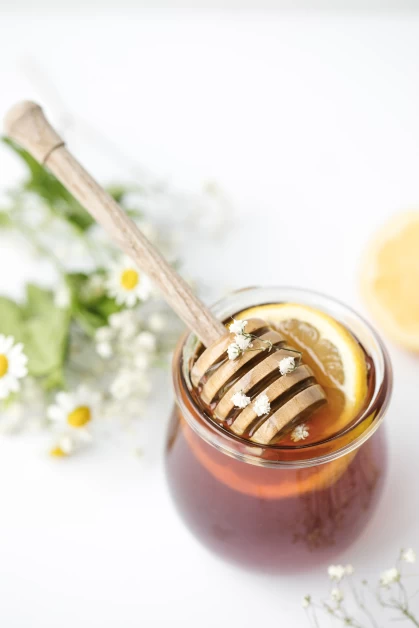Table of Contents
Introduction
Manuka honey is a popular natural remedy that has gained attention for its potential benefits in reducing anxiety. In this article, we will explore the use of manuka honey for anxiety and discuss its effectiveness as a holistic approach to managing this common condition. We will also delve into the scientific research supporting these claims and provide practical tips on how to incorporate manuka honey into your daily routine for maximum benefits.
What is Manuka Honey?
Understanding the Origins and Properties of Manuka Honey
Manuka honey is derived from the nectar of the manuka tree, scientifically known as Leptospermum scoparium. This tree is native to New Zealand and Australia, where it has been utilized for centuries in traditional medicine. Manuka honey stands out from other types of honey due to its unique composition and properties.
The Active Ingredient: Methylglyoxal (MGO)
One of the key factors that sets manuka honey apart is its high concentration of methylglyoxal (MGO), which is a natural compound responsible for its antibacterial properties. MGO is formed in the honey from the conversion of dihydroxyacetone, a compound found in the nectar of manuka flowers. The higher the MGO content, the stronger the antimicrobial activity of the honey.
Quality Markers: UMF and MGO Ratings
To ensure the authenticity and potency of manuka honey, two quality markers are commonly used: Unique Manuka Factor (UMF) and MGO ratings. UMF is a grading system that takes into account various compounds, including MGO, to assess the quality and purity of manuka honey. The MGO rating, on the other hand, specifically indicates the concentration of MGO in the honey. Both UMF and MGO ratings provide consumers with reassurance about the quality and therapeutic potential of the product.
How Manuka Honey May Help with Anxiety
Exploring the Link between Manuka Honey and Anxiety Relief
The potential benefits of manuka honey for anxiety can be attributed to its various therapeutic properties. Several mechanisms have been proposed to explain how manuka honey may help provide relief from anxiety symptoms:
-
Promoting Relaxation: Manuka honey contains natural sugars, such as glucose and fructose, which can provide an energy boost to the body. This boost can help regulate blood sugar levels and promote a sense of relaxation, thereby reducing anxiety.
-
Supporting Gut Health: Emerging research suggests a link between gut health and mental well-being. Manuka honey possesses prebiotic properties, which means it can promote the growth of beneficial bacteria in the gut. A healthy gut microbiome has been associated with improved mood and decreased anxiety levels.
-
Reducing Inflammation: Chronic inflammation has been linked to an increased risk of anxiety and depression. Manuka honey exhibits anti-inflammatory effects, attributed to its high antioxidant content. By reducing inflammation, manuka honey may help alleviate anxiety symptoms.
Scientific Evidence: What the Research Says
While the potential benefits of manuka honey for anxiety are promising, it is important to consider the scientific evidence supporting these claims. Although research specifically investigating manuka honey’s effects on anxiety is limited, several studies have explored its potential in related areas:
-
Antimicrobial Activity: Manuka honey has been extensively studied for its antimicrobial properties. Its effectiveness against various bacteria, fungi, and viruses has been demonstrated. By reducing infections, manuka honey may indirectly contribute to a decrease in anxiety symptoms caused by immune system activation.
-
Improvement in Sleep Quality: Poor sleep is often associated with increased anxiety levels. Some studies have indicated that honey, including manuka honey, may improve sleep quality. By promoting better sleep, manuka honey may indirectly help reduce anxiety symptoms.
-
Anti-Inflammatory Effects: As mentioned earlier, manuka honey exhibits anti-inflammatory effects in the body. While inflammation and anxiety are intricately linked, studies exploring the direct effects of manuka honey on anxiety symptoms are needed to validate this potential benefit.
Practical Tips: Incorporating Manuka Honey into Your Routine
Now that we have explored the potential benefits of manuka honey for anxiety, let’s discuss how you can incorporate this natural remedy into your daily routine:
-
Choose High-Quality Manuka Honey: To ensure you are reaping the maximum benefits, opt for manuka honey with a high UMF or MGO rating. These ratings guarantee the authenticity and therapeutic potency of the product.
-
Enjoy Manuka Honey Plain: Manuka honey can be consumed directly, either by taking a spoonful or incorporating it into your favorite beverage or recipe. Consuming it plain allows you to experience its natural flavors and potential benefits more fully.
-
Combine with Other Relaxing Ingredients: Enhance the anxiolytic properties of manuka honey by combining it with other calming ingredients. For example, you can create a soothing herbal tea by adding manuka honey, chamomile, and lavender to hot water.
-
Use as a Natural Sweetener: Replace refined sugars and artificial sweeteners with manuka honey in your diet. Not only does this provide a healthier alternative, but it also allows you to incorporate the potential anxiety-relieving properties of manuka honey into various dishes and beverages.
Conclusion
In conclusion, manuka honey shows promise as a natural remedy for anxiety due to its various therapeutic properties. While scientific research specifically investigating its effects on anxiety is limited, studies in related areas indicate that manuka honey may indirectly help alleviate anxiety symptoms. By promoting relaxation, supporting gut health, and reducing inflammation, manuka honey can potentially contribute to an overall sense of well-being. Incorporating manuka honey into your daily routine, alongside other healthy lifestyle practices, may provide a holistic approach to managing anxiety.



